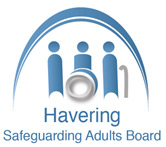About Us
The Havering Safeguarding Adults Board (SAB) is a group made up of representatives from a wide range of local agencies and services that support adults in various different ways, including:
The Havering SAB is responsible for ensuring that agencies work together to safeguard and promote the wellbeing of vulnerable adults in the borough, and the group meets every two months to drive and oversee safeguarding partnership activity.
The Havering SAB is supported by a multi-agency Quality and Effectiveness Working Group, which also meets regularly throughout the year to scrutinise performance data and other sources of information to monitor the effectiveness of the local multi-agency system for safeguarding vulnerable adults.
The Havering SAB also has a multi-agency Learning and Improvement Executive meets twice a year to monitor and progress the implementation of learning from Safeguarding Adults Reviews.
As defined in the Care Act 2014 and its supporting statutory guidance, the main objective of a SAB is ‘to assure itself that local safeguarding arrangements and partners act to help and protect adults in its area who meet the criteria for care and support’
Each SAB is tasked with the following three core duties:
- to publish an evidence-based strategic plan for each financial year – developed with local community involvement and through consultation with the local Healthwatch organisation – that sets out how the SAB will meet its main objectives and what its members will do to achieve this;
- to publish an annual report detailing what the SAB has done during the year to achieve its main objectives and implement its strategic plan, and what each member has done to implement the strategy, as well as detailing; and
- to conduct SARs in accordance with Section 44 of the Care Act 2014, identifying lessons to be learnt from serious safeguarding cases and using them to improve how partner agencies work together to safeguard adults.
Each SAB also has the following core responsibility:
- to develop preventative strategies that aim to reduce instances of abuse and neglect in its area.
Further to these statutory accountabilities, each SAB should:
- work with local agencies and services with regard to the actions they need to take to ensure the protection of adults;
- enable partner agencies to collaborate on ways to reduce risk of abuse and neglect, and to challenge and hold each other to account when required;
- promote multi-agency training and consider any specialist training that may be required;
- identify types of circumstances giving grounds for concern and when they should be considered as a safeguarding notification to the local authority;
- establish ways of analysing and interrogating data on safeguarding activity that increase the SAB’s understanding of prevalence of abuse and neglect locally that builds up a picture over time;
- determines it arrangements for peer review and self-audit;
- establishing mechanisms for developing policies and strategies for protecting adults, involving collaboration and consultation with relevant agencies and also taking into account the views of adults with care and support needs, their families, carers and advocates;
- formulate guidance about the arrangements for managing adult safeguarding, dealing with complaints, grievances and malpractice in relation to safeguarding adults; and
- develop strategies to deal with the impact of issues of race, ethnicity, religion, gender and gender orientation, sexual orientation, age, disadvantage and disability on abuse and neglect.












